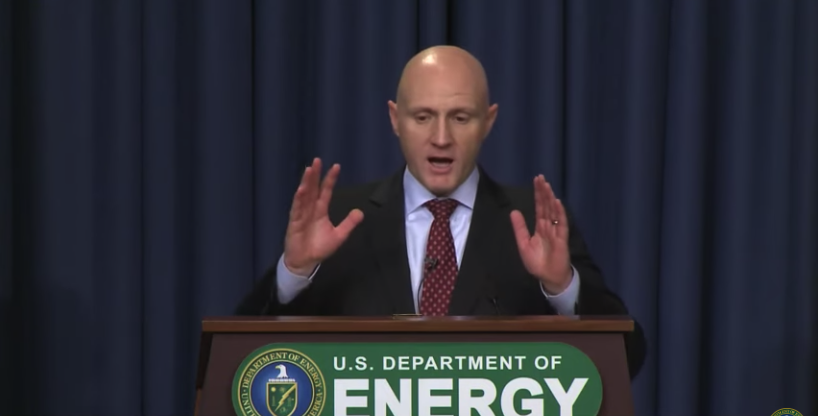When President Trump nominated long-time Koch network insider and renewable energy antagonist Daniel Simmons to lead the Department of Energy’s (DOE) Office of Energy Efficiency and Renewable Energy (EERE), the administration’s priorities for federal energy programs were made abundantly clear. Simmons had, after all, been serving at the time of his nomination as Vice President for Policy at a Koch-funded think tank that had, in 2015, called for the outright elimination of the very office he was tapped to lead.
The Trump administration budget proposal released this week, for fiscal year 2020, goes a long way toward delivering this wish to the Koch network, calling for a 70 percent reduction in funding for the EERE and scrapping entirely the Department of Energy’s loan programs. The EERE ultimately received $2.4 billion in the current 2019 budget, and the current Trump proposal would fund it at $696 million.
The DOE’s renewable energy programs have long been targets of the Kochs’ network of “free market” think tanks and advocacy organizations, including the Institute for Energy Research (IER) and its sister organiation, the American Energy Alliance (AEA), where Simmons worked for a decade before joining the Trump administration.
In fact, while Simmons was VP of Policy at AEA, the group called on Congress to eliminate the EERE entirely:
In a proposal on ways to save money at the DOE, the AEA wrote:
“The role of this office is to promote and subsidize ‘clean energy’ as determined by government bureaucrats. However, the government should not be in the business of trying to commercialize products and services it deems ‘clean’. This office aims to control multiple sectors of the economy, from energy production and transmission to manufacturing and construction. Cutting this office would help end large corporate handouts to failed technologies, such as the disastrous Chevy Volt bailout, and allow for true market-based innovation and development. Est. savings 2016-2020 = $9.78 billion.”
Daniel Simmons Has Fought Renewables for Decades in Koch-Funded Organizations
While writing on the Koch-funded (and founded) Institute for Energy Research blog, Simmons regularly bashed the programs and initiatives that his future office, the EERE, administers. Simmons once called wind turbines “cuisinarts of the sky.” In another blog post, Simmons slammed wind power for hurting farmers.
(That’s despite the fact that rural landowners are benefiting the most from wind power, which is already paying them roughly $222 million per year. That figure is expected to rise to nearly $1 billion annually by 2030. Farmers are calling wind development “our financial future.”)
Before his time at the Institute for Energy Research and American Energy Alliance, Simmons was director of the Natural Resources Task Force at the American Legislative Exchange Council (ALEC), the Koch-tied organization designed to link state legislators with corporations and create templates for state legislation.
There, he was responsible for producing the 2007 edition of ALEC’s report, “Energy, Environment, and Agriculture: A Guide for State Legislators,” which as the Energy and Policy Institute describes, “illustrates how the group works to manufacture doubt about the causes and risks of climate change and attack clean energy policies on behalf of its (now dwindling) network of fossil fuel and utility industry funders.”
When he arrived at the DOE, Simmons made an effort to gloss over his history of bashing renewables. “I like renewables & efficiency. I know that’s contrary to some of the things that have been written about me, but it’s true,” Simmons wrote, as reported by E&E News.
Seeing as the White House typically asks for input from offices and departments in generating budget requests, it’s safe to assume that Simmons, as the head of his office, had some role in the proposal released this week.
As for his old employers, the American Energy Alliance gave a full-throated endorsement of the Trump budget. The group had no criticism of the proposed budget’s preservation of tax credits and incentives to oil and gas producers, which total at least $3.7 billion every year, far more than the savings generated by gutting the renewables and loans programs.
Main image: Daniel Simmons during his Department of Energy swearing-in ceremony Credit: Department of Energy, public domain
Subscribe to our newsletter
Stay up to date with DeSmog news and alerts








